Many famous artists made the journey from anonymous creators who offer something stylistically new which is favoured by the audience because they go against dominant trends and structures, only to become established creators within the system, financially secure and overexposed in the media, but shunned by the audience, with critics not sparing them either as they repeat established forms everyone finds dull. These individuals who once aroused sympathies and enthusiasm end up triggering only anger and resignation.
That such a scenario is possible in sports, we can see from the example of José Mourinho. He made the journey from an unknown coach who seriously disrupted the dominance of Europe’s wealthiest clubs with Porto and thus won sympathies of a vast number of fans across the footballing world always hungry for the victories of a small club over the clubs worth multiple billions of euros, to one of the best paid servants of the wealthiest of clubs, an individual overexposed in the media who calls himself the Special One, always putting himself first, while managing teams by still persisting on forcing settled forms everyone finds dull, even some of the most hard-core fans of the teams he manages, extending even to many of his admirers.
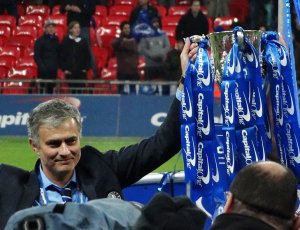
Mourinho won 33 trophies in his career | Photo: Chelsea Debs
José Mourinho was born on January 26th 1963, in Setubal, Portugal. José’s career has been a vertiginous, turbulent and eventful one. However, this career could be summed up in one sentence, just like it can be expressed factographically – with the fascinating list of trophies won which places the Portuguese coach in the same pantheon with some of the biggest names in football’s history. Whatever you think of Mourinho, facts illustrate his significance in football’s history.
He’s had a rather short career as a footballer, got his coaching badges in an academic manner, spent years as an understudy at Barcelona, a short stint with Benfica, some notable results at Uniao Leiria, moving on to Porto to conquer the footballing Europe. He then molded the mighty Chelsea into existence, orchestrated triumphal and imposing restoration of Inter to its former glory, made an attempt at demolishing Barcelona’s empire with Real Madrid, returned to Chelsea only to part ways turbulently, followed by an ambitious takeover of Manchester United that ended with him leaving the great English club ingloriously.
José Mourinho has so far managed eight teams (Benfica, Uniao Leiria, Porto, Chelsea twice, Inter, Real Madrid, Manchester United), he’s won 25 trophies and many individual awards like the FIFA World Coach of the Year in 2010., the Order of Prince Henry, PFA Portuguese Manager of the Year, and an honorary doctorate from the Lisbon Technical University. He won national titles twice in Portugal with Porto, three titles in England with Chelsea, two scudettos with Inter, as well as one title in Spain with Real Madrid, along with a number of domestic cups. He won the Champions League twice, with Porto and Inter. With Porto he wonthe UEFA Cup as well, and he won the Europa League with Manchester United. Conclusive with December 16th 2018., Mourinho has a 64,8 win percentage in the 909 matches he managed in his career.
Still, following his sacking from Manchester United a question has to be asked – what are the reasons behind his failure and, more generally, the downward trend in his career?
To answer this question, we first need to get acquainted with the basics behind his work in coaching and the successes he’s achieved. On one occasion, he stated that the footballing world is full of people with fantastic philosophies, but that the reality of football is the only thing that truly matters. However, by analysing the reality (the style of play of the teams he’s managed, his statements, the statements from the players he’s coached, the statements from other managers and the presidents of the clubs that hired him), we can clearly see him developing a particular footballing philosophy and modus operandi with his players.
Mourinho’s footballing philosophy
Costinha, a player Mourinho coached at Porto, points out that the teams under José’s tenure lived off their own dynamics. Mourinho’s teams would change a system they play in, but they would never give up on a particular philosophy. As this player noted, “one of the most important aspects about José, which I support, is that the other team has to be the one making the changes, you have to keep your own identity.” Costinha is convinced that the aforementioned principle represents the constant in Mourinho’s career. The only things that change throughout his career are his clubs and players. José always sticks to his principles.
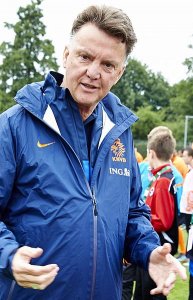
Mourinho was van Gaal’s assistant in Barcelona | Photo: ING Nederland
To those who have kept a close eye on Mourinho’s teams, it is pretty clear what footballing philosophy was enforced with such persistence and perseverance by José Mourinho. Louis van Gaal, the Dutch manager who worked with Mourinho at Barcelona when the Portuguese coach was one of his assistants, noted that José is the type of coach who trusts defending more than he trusts attacking. The fact that he’s made his name as a coach with van Gaal and Bobby Robson at Barcelona, where attacking football is a responsibility, didn’t leave a noticeable mark on Mourinho’s coaching. Even though his Porto team had visible elements of Michels–Cruyff totaalvoetbal, or the “Barçajax” school, as Jonathan Wilson calls this football concept. It is Jonathan Wilson who pointed out how “Barcajax” influence wasn’t as strong with Mourinho as was the influence of Vitor Frade, one of the pioneers of periodisation who preferred his defence in mid or low zonal block while absorbing the pressure from the opposition. Such an approach requires conceding possession of the ball. According to Mourinho, having possession of the ball presents a risk, while it can present safety in a defensive set up. Simon Kuper highlights how the ideologue of totalvoerbal Johan Cruyff thought controlling the ball means controlling the space, while Mourinho thinks the space is controlled by ceding control of the ball. Possession means risk.
Mourinho brought light to one of the big issues in English football – inadequate coaching of young players. He criticized the English for pigeon-holing young players to play in one position only, while modern football demands more versatility from players. He could have learned that lesson while an assistant at Barcelona. At first glance, this could paint Mourinho as a follower of totalvoetbal, but his primary preference for defensive style of play is completely opposite to the fundamentals of totalvoetbal. However, Mourinho never shied away from turning his players into specialists, even as he criticized English football for the same thing. The great Arrigo Sacchi believes one of the main issues for the development of the game at the turn of the century was the tendency for players to be specialized at the expense of universality, brought to the mainstream by the Dutch with totalvoetbal, which he also applied and pursued in Italy as the manager of AC Milan during their glory years as the dominant European side. For Sacchi, there’s no doubt that this proliferation of specialists is a mark of reactive football. According to Sacchi’s conception of totalvoetbal, the player who has the ball must be capable of playing as a regista (playmaker), but when the midfield consists of players limited to specialized function, this becomes an impossible task. For Sacchi, a paradigmatic example of a midfield specialist is Claude Makelele, who simply wasn’t capable of playing as a regista. It is Makelele, and other players of his ilk, who is exactly the type of player preferred and even adored by Mourinho. Makelele was one of the most important cog in the Chelsea team that won league titles under Mourinho.
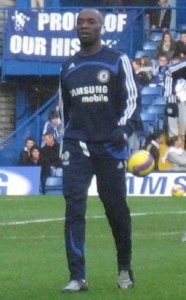
Makelele was one of Mourinho’s favourites | Photo: Mark Freeman
No matter how much he criticized the English approach, Mourinho is a coach with preference for specialized players. This is particularly true for his midfielders. Mourinho’s tactical specialty, which he believes is his tactical innovation, is playing with three midfielders with defensive attributes (a so-called ‘trivote’) who are allowed to be aggressive in the opposition half, but who primarily create a solid block in front of their back four in their own half. Thus, Mourinho would pick the midfield trio of Makelele, Lampard and Thiago (and later Essien) as starters at Chelsea. At Real Madrid, he would occasionally play the midfield trio of Xabi Alonso, Khedira and Lassana Diarra, even Alonso, Diarra and Pepe in matches against Barcelona, although in this set up in the middle of the pitch he had a player who brought creativity in Alonso. At Manchester united, he would often field a highly defensive midfield trio of Matić–Herrera–Fellaini. Mourinho, after all, might actually be the pioneer of the defensive 4-3-3. Mourinho generally seeks to select and build a physically dominant side that crushes opponents with aggressiveness and power. This is why he adores players like Fellaini who contribute so much on both defence and offense. Likewise, as long as there’s tendency in modern football to field center-backs capable of being involved in creating attacks, Mourinho will keep limiting their role to perform defensive tasks almost exclusively. Jorge Costa, who played as a center-back at Porto under Mourinho, stated how José never allowed him to advance the field with the ball in his possession, to him nor any other center-back. “José hated whenever I’d do that while making it clear that such an action can lead to the disbalancing of the whole team,” Costa says. “In cases when fullbacks were allowed to advance further down the pitch, their advances always had to be covered by the midfielders tucking in.” Because Mourinho sticks to his principles which entail at least five players in defence, this means some players are barred from involvement in the attacking phase, which is contrary to one of the main postulates of totalvoetbal.
Diego Torres, a Spanish journalist and harsh critic of Mourinho in his controversial biography about the Portuguese manager (The Special One: The Dark Side of José Mourinho), reduced Mourinho’s big game winning formula, and maybe even his entire footballing philosophy, to seven key elements, or principles:
- The game is won by the team who commit fewer errors.
- Football favours whoever provokes more errors in the opposition.
- Away from home, instead of trying to be superior to the opposition, it’s better to encourage their mistakes.
- Whoever has the ball is more likely to make a mistake
- Whoever renounces possession reduces the possibility of making a mistake.
- Whoever has the ball has fear.
- Whoever does not have it is thereby stronger.
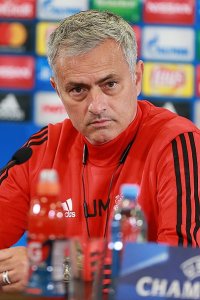
He was manager of United until December 2018 | Photo: Дмитрий Голубович
Perhaps the essence of Mourinho’s footballing philosophy, or more accurately – the way he imagines the game should be played, is best found in one of Cristiano Ronaldo’s post match statements. After Juventus got beaten by Manchester United, Ronaldo said: “We dominated the game for 90 minutes, had so many chances, could’ve killed it off three or four times, but we relaxed and were punished. Manchester United did nothing to win the game. You can’t even talk about luck, because you have to find your own luck and in this case we just gifted it to them.”
It appears as if Mourinho would like for his opponent to beat themselves, while his players defend and patiently wait to capitalize on the opponent’s mistakes. Mourinho is definitely a type of manager who feeds on the mistakes of others. The ideal he aspires to might even be the scenario where his team doesn’t make a single shot on target, and yet score a goal. And no matter how impossible it may seem, Mourinho’s team succeeded in just that. For example, during 2004/2005 season against Barcelona at Camp Nou Chelsea led 1:0 at halftime without a single shot on target – Barcelona’s Belletti scored an own goal. Mourinho might be a footballing Zen Buddhist proponent, or rather a taoist philosopher who, in essence, sees passivity as activity. He might as well be a follower of the type of passive mindfulness concept known as Wu Wei in the taoist philosophy. The founder of the taoist school of thought Lao Tzu wrote: “I cannot know them; it is only by means of non-action that I control them.” Maybe we can reduce Mourinho’s footballing philosophy to a quote the Roman philosopher, lawyer and orator Cicero attributes to the Roman statesmen Marcus Porcius Cato the Elder: “I am never less alone than when alone, nor less at leisure than when at leisure.”
However, the secret of the rise of José Mourinho cannot be reduced to the philosophy of non-action alone, not the least because its Chinese iteration actually means action without stress, which is impossible to imagine in football, a highly intense activity. What matters most is its application. This is where Mourinho’s brilliance is most visible. After Barcelona was beaten by Inter Milan in the 2010 Champions League semi-final, journalists asked Xavi Hernandez to compare Guardiola to Mourinho. With all the differences between them, Xavi highlighted one striking similarity which connects them. Both of them are very methodical and absolutely dedicated to the tactical planning of matches. Porto goalkeeper Vitor Baia said Mourinho paid so much attention to details when preparing games tactically, in addition to anticipating various scenarios that might develop throughout the course of a match. “Sometimes it seemed like he’s psychic,” said Baia. The famous goalkeeper also reminisced how Mourinho predicted the match between Porto and Benfica to the smallest of details. He predicted all the tactical moves made by the then manager of Benfica Jose Antonio Camacho. Baia also remembers how they practiced to defend with 10 men because Mourinho predicted the referee won’t be able to withstand the pressure to send off one of their players. Then everything happened just like José predicted. Having practiced playing with 10 men, his Porto team defended quite comfortably to see Benfica out.
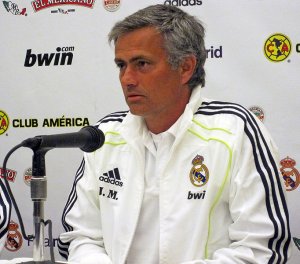
His press conference are never boring | Photo: Flickr
A part of the strategy he uses to prepare his players mentally are his performances during press conferences, where he provokes his opponents and puts pressure on the referees. The goal is to have his players shake off pressure and encourage them to be strong mentally, out of spite even. On a similar note, Mourinho is well-known to grant his players all the resources needed to win. Martin O’Neill, who coached Celtic when his side faced Porto in the UEFA Cup final, accused Mourinho and his team of time-wasting and faking injuries. This is all a part of José’s tactical masterplan.
In his autobiography, Alex Ferguson wrote about Rafael Benitez, with whom he wasn’t on the best of terms: “Despite my reservations about him as a person and a manager, Benitez persuaded his players to work their socks off for him, so there must be some inspirational quality there: fear, or respect, or skill on his part. You never saw his teams throw in the towel, and he deserves the credit for that.”
What the great Alex Ferguson wrote about Benitez is even more applicable to Mourinho. This is generally the rule for the managers whose philosophy lies on defending. In order to defend well, aside from tactical discipline, you also need a will of steel. Defending really rests on willpower, trust and team cohesion. Without this, even the most ingenious tactical adjustments will remain just an empty form. Because players are almost never short of inspiration when it comes to attacking, motivation is essential for disciplined and dedicated defending. Mourinho’s teams defended exceptionally well because he knew how to inspire players to give their maximum effort when performing the tactical instructions related to defending their goal. Mourinho is generally considered a great motivator. Vitor Baia also pointed out how good a psychologist José Mourinho is. “He knew everybody so deeply that he could control our emotions in every situation,” said Baia. A great number of players managed by Mourinho think highly of him, players such as Dejan Stanković. Maybe the secret of José Mourinho’s success can be found in his determination to motivate his players to defend as a group dedicated to performing instructions by giving their last bit of energy.
All in all, it turns out Mourinho’s approach to football rests on three foundations:
- Sticking to the philosophy which lies on defensive organization, while also dominating physically and taking advantage of the opposition’s mistakes.
- Dedicated and detailed analysis of opponents and the construction of the tactical plan for the match.
- Insistence on player discipline, absolute authority of the manager and paying attention to mental readiness of his players while encouraging and motivating players to perform in line with the manager’s vision. (this aspect of Mourinho’s work, however, has two sides – it is widely known that Mourinho doesn’t shy away from criticizing his players in public and assigning them responsibility for bad results.)
Once we take these foundations into account, it shouldn’t come as a surprise that the summit of Mourinho’s career came at Inter Milan where he won the so-called treble. It is of less importance if it is only by chance that he landed a job with Inter or if it was a wise decision made by upper management at Inter. What does matter is that Mourinho brought the European title back to the club after 45 years of drought. The European Cup, as it was called back then, was won by Helenio Herrera in the dugout. However, there’s an even deeper connection between Mourinho and Herrera. Massimo Moratti, the president of Inter, pointed out how Mourinho is very much like Herrera in many aspects.
In the second part of Morinho’s career analysis you will read why he is being comapred with Herrera, what caused his fall and how he can return to the paths of glory.

